
BREAST CANCER RESEARCH AND TREATMENT
Scope & Guideline
Leading the Charge in Breast Cancer Innovation
Introduction
Aims and Scopes
- Clinical Trials and Patient Outcomes:
Research focused on clinical trials that assess the efficacy and safety of new treatments, including chemotherapy, targeted therapies, and immunotherapies, as well as studies that evaluate patient outcomes and quality of life. - Molecular and Genetic Insights:
Investigations into the molecular and genetic underpinnings of breast cancer, including studies on biomarkers, genetic mutations, and their implications for precision medicine and targeted therapies. - Epidemiology and Risk Factors:
Studies examining the epidemiology of breast cancer, including risk factors such as genetics, lifestyle, and environmental influences, as well as trends in incidence and mortality across different populations. - Innovative Diagnostic Techniques:
Research into new diagnostic methods, including imaging technologies and biomarker assays, that improve early detection and monitoring of breast cancer. - Psychosocial Factors and Survivorship:
Exploration of the psychosocial aspects of breast cancer, including the impact of diagnosis and treatment on mental health, coping mechanisms, and survivorship care. - Health Disparities and Access to Care:
Research addressing disparities in breast cancer outcomes related to socioeconomic status, race, and geographical location, as well as barriers to care and treatment adherence.
Trending and Emerging
- Precision Medicine and Genomics:
An increasing number of studies are focusing on precision medicine approaches, utilizing genomic and molecular profiling to tailor treatments to individual patients, thereby improving outcomes. - Immunotherapy and Targeted Therapies:
Research on immunotherapy and targeted therapies is on the rise, with studies exploring novel agents and combination therapies that enhance the immune response against breast cancer. - Quality of Life and Patient-Centered Care:
There is a growing emphasis on patient-reported outcomes, quality of life assessments, and psychosocial support for breast cancer survivors, highlighting the importance of holistic care. - Digital Health and Telemedicine:
The integration of digital health technologies and telemedicine in breast cancer care has gained traction, particularly in the wake of the COVID-19 pandemic, with studies exploring their effectiveness and patient acceptance. - Health Disparities and Equity in Care:
Emerging research is increasingly addressing health disparities in breast cancer outcomes, focusing on access to care, treatment adherence, and the influence of socioeconomic factors on patient experiences. - Microbiome and Its Role in Cancer:
Research exploring the role of the microbiome in breast cancer development and treatment responses is gaining momentum, indicating a new frontier in understanding cancer biology.
Declining or Waning
- Traditional Chemotherapy Approaches:
There is a noticeable decline in studies focusing solely on traditional chemotherapy regimens, as research increasingly shifts towards personalized medicine and targeted therapies that consider genetic and molecular profiles. - Basic Laboratory Research:
Research that primarily emphasizes basic laboratory findings without direct clinical application or relevance is becoming less prominent as the journal prioritizes translational research that bridges basic science and clinical outcomes. - Epidemiological Studies without Intervention:
Epidemiological studies that do not propose interventions or actionable insights are less frequently published, reflecting a trend towards research that not only identifies risk factors but also suggests ways to mitigate those risks. - Single-Cancer Focus Research:
There is a waning interest in research that examines breast cancer in isolation, with a growing emphasis on studies that consider breast cancer in the context of other comorbid conditions, such as obesity, diabetes, and mental health issues.
Similar Journals

CANCER
Exploring the depths of cancer science for better outcomes.CANCER, published by Wiley, stands as a pivotal journal in the field of oncology and cancer research, boasting an impressive impact factor and consistently dynamic growth since its inception in 1948. With an ISSN of 0008-543X and an E-ISSN of 1097-0142, this esteemed journal is recognized for its rigorous peer-reviewed articles, making significant contributions to the understanding of cancer biology, treatment modalities, and clinical practices. CANCER holds a distinguished position in the academic community, securing its placement in the Q1 category for both cancer research and oncology, and ranks within the top percentiles on Scopus, indicating its high impact and relevance. The journal is particularly beneficial for researchers, professionals, and students seeking to stay abreast of the latest advancements in cancer science. By addressing essential research questions and providing pathways for new therapies, CANCER continues to play a crucial role in shaping the future of oncology and improving patient outcomes.
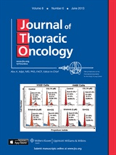
Journal of Thoracic Oncology
Leading the Charge in Thoracic Malignancy InsightsJournal of Thoracic Oncology, published by Elsevier Science Inc, is a premier scholarly outlet dedicated to advancing the field of thoracic oncology. With an impressive impact factor and consistently rated in the Q1 quartile across several pertinent categories such as Medicine, Oncology, and Pulmonary and Respiratory Medicine, this journal stands at the forefront of research dissemination. Covering a broad scope that includes innovative therapeutic approaches, clinical trials, and the molecular underpinnings of thoracic malignancies, the journal serves as a vital resource for researchers, healthcare professionals, and students seeking to enhance their understanding of thoracic cancer and its treatment. With publication dates converging from 2006 to 2024, the Journal of Thoracic Oncology fosters a collaborative scholarly community by providing a platform for high-quality research while ensuring accessibility through traditional publication formats. Positioned in the heart of New York City, this journal not only reflects the cutting-edge advancements in oncology but also plays a pivotal role in shaping the future of thoracic cancer care.

Breast Journal
Empowering clinicians with cutting-edge insights.The Breast Journal, published by Wiley-Hindawi, is a distinguished Open Access journal dedicated to the fields of internal medicine, oncology, and surgery with a particular focus on breast health and disease. Since its inception in 1995, the journal has become an essential resource for researchers and clinicians, facilitating the dissemination of high-quality research and innovative clinical practices. With an impact factor reflecting robust scholarly influence and a ranking in the Q3 quartile for both internal medicine and oncology, as well as Q2 in surgery, it showcases significant contributions that advance knowledge and improve patient outcomes. Offering unparalleled access to its articles, The Breast Journal aims to support a global audience in exploring the multifaceted challenges and breakthroughs in breast-related health, making it a vital platform for shared learning and scientific discourse.

South Asian Journal of Cancer
Advancing cancer research in South Asia.South Asian Journal of Cancer, published by GEORG THIEME VERLAG KG, is a pivotal platform for research in the fields of oncology and cancer research. Established in 2012 and operating under an Open Access model, this journal aims to disseminate high-quality, peer-reviewed articles that address crucial developments in cancer treatment, prevention, and research, particularly within the South Asian context. Despite its young history, the journal has been positioned within the Q4 quartile for both Cancer Research and Oncology, and while current Scopus rankings indicate it resides in the lower percentiles, its commitment to amplifying regional voices and research is invaluable. With its headquarters in Stuttgart, Germany, and a global readership, South Asian Journal of Cancer is dedicated to enhancing collaboration among researchers, healthcare professionals, and students, fostering a space for innovative ideas and advancements in cancer care as we progress through to 2024.
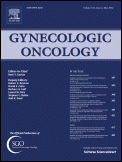
Gynecologic Oncology
Unveiling Breakthroughs in Gynecologic Cancer ManagementGynecologic Oncology, an esteemed journal published by Academic Press Inc Elsevier Science, stands at the forefront of research in the domains of Obstetrics and Gynecology and Oncology. With an exceptional track record dating from 1972 to 2024, this journal has established itself as a vital resource for scholars and practitioners alike, boasting a remarkable Q1 ranking in both fields as of 2023. Gynecologic Oncology not only ranks #13 out of 209 in Obstetrics and Gynecology and #72 out of 404 in Oncology but also operates within the top percentiles of academic influence, with a 94th percentile in Obstetrics and Gynecology and an 82nd percentile in Oncology on Scopus. Although the journal does not currently offer open access, it remains crucial for disseminating original research, reviews, and advances in the management and treatment of gynecological cancers. Researchers and health professionals will find this journal indispensable for staying informed on the latest advancements and breakthroughs in this vital area of medicine, fostering a deeper understanding and potentially transforming patient care practices.
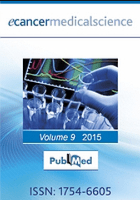
eCancerMedicalScience
Fostering insights for a world free of cancer.eCancerMedicalScience, a leading open-access journal published by the eCancer Global Foundation, is dedicated to advancing the field of cancer research and oncology. With its inception in 2007, this esteemed journal has emerged as a pivotal platform for disseminating groundbreaking research, innovative treatments, and comprehensive reviews in the cancer domain. Based in the United Kingdom, eCancerMedicalScience has continuously contributed to the academic community with its rigorous peer-review process and broad-ranging scope, now encompassing topics from clinical oncology to molecular biology. Currently ranked in the Q3 quartile for both Cancer Research and Oncology in 2023, the journal provides a significant opportunity for researchers, professionals, and students to access valuable insights and share their findings within a global network. The commitment to open access ensures that knowledge is readily available, fostering collaborative efforts to combat cancer and improve patient outcomes.
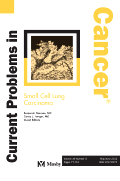
CURRENT PROBLEMS IN CANCER
Catalyzing Change: Addressing the Pressing Issues in Cancer ResearchCURRENT PROBLEMS IN CANCER is an esteemed journal published by MOSBY-ELSEVIER, dedicated to advancing the field of oncology and cancer research. With an ISSN of 0147-0272 and an E-ISSN of 1535-6345, it has been a vital resource for over four decades, converging years of expertise from 1976 to 2024. The journal is recognized for its impactful contribution to the field, currently holding a Q3 ranking in Cancer Research and a Q2 ranking in Oncology, reflecting its importance in disseminating significant advancements and discussions in the field. It is ranked #164 out of 404 in Medicine _ Oncology and #131 out of 230 in Biochemistry, Genetics and Molecular Biology _ Cancer Research on Scopus, indicating its relevance and reach among academic circles. Although it does not offer open access, the journal remains a crucial platform for researchers and professionals seeking to explore contemporary issues in cancer treatment and management. With its commitment to quality and innovation, CURRENT PROBLEMS IN CANCER serves as an essential conduit for knowledge sharing and research development in oncology and cancer science.
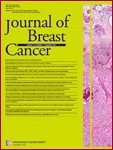
Journal of Breast Cancer
Fostering Global Collaboration in Breast Cancer StudiesJournal of Breast Cancer, published by the Korean Breast Cancer Society, stands as a pivotal platform for disseminating groundbreaking research and advancements in the field of breast cancer. With an ISSN of 1738-6756 and an E-ISSN of 2092-9900, this open-access journal has been a vital resource since 1998, ensuring that important findings are accessible to all. The journal is situated in South Korea, at 163 Sinmunro 1-ga Jongro-gu, Official Building, Suite 2024, Seoul 110-999, South Korea, fostering an international exchange of knowledge within the scientific community. As a leader in oncology and cancer research, it is categorized in the Q3 quartile for both fields as of 2023, with Scopus rankings reflecting its influence and reach. Researchers and clinicians alike benefit from its rigorous peer-review process and diverse array of articles, which cover the latest studies, treatment strategies, and clinical trials. The Journal of Breast Cancer plays an essential role in shaping future research directions and improving patient outcomes in breast cancer care, making it an invaluable resource for all stakeholders in the oncology field.

BRITISH JOURNAL OF CANCER
Elevating the Standards of Cancer Research.The British Journal of Cancer, published by SpringerNature, stands as a preeminent resource in the fields of Cancer Research and Oncology, with a distinguished history of publication dating back to 1947. With its Q1 rank in both categories for 2023, this journal is among the top-tier publications, offering cutting-edge research and insights into the biology, etiology, and treatment of cancer. The journal’s rigorous peer-review process ensures that readers are presented with high-quality studies that contribute to the advancement of cancer knowledge and clinical practice. Operating from the United Kingdom, it has garnered a notable impact factor and ranks impressively within Scopus, making it an essential publication for researchers, healthcare professionals, and students who are dedicated to understanding cancer's complexities. Access to the journal's articles is available in traditional formats, providing a versatile platform for disseminating pivotal research. As we move towards a future where cancer treatment and prevention remain crucial, the British Journal of Cancer continues to play a vital role in shaping the dialogue and discoveries within the oncology community.
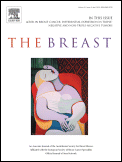
BREAST
Fostering collaboration for improved patient outcomes.BREAST is a leading peer-reviewed journal dedicated to advancing knowledge and practice in the fields of cancer research, oncology, and surgery, published by Churchill Livingstone. With an impressive impact factor and a prestigious Q1 ranking in multiple categories including Cancer Research, Medicine, and Surgery, the journal consistently delivers high-quality content that informs and inspires researchers, clinicians, and educators. Since its transition to Open Access in 2020, BREAST has significantly expanded its reach, providing immediate and unrestricted access to pivotal studies and findings in breast health and disease management. With a history dating back to 1992 and converging to 2024, the journal serves as an essential resource for the latest developments and innovative approaches in the clinical and biomedical aspects of breast care. Scholars and professionals alike can explore a wealth of research aimed at improving patient outcomes and fostering scientific dialogue in this vital area of healthcare.